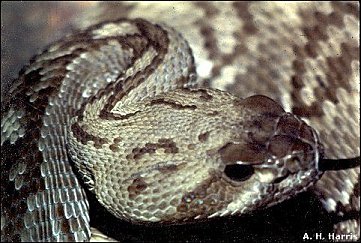
Some of you may remember the old song that goes "Mama's little baby's got no shoes". Well, that's not the worse of it. Many critters lack all sorts of things that we never really give a thought to. Like ears or eyelids!
Who do you know that doesn't have ears or eyelids? Have you looked closely at your favorite snake? That's right— no ears and no eyelids. Depending on your disposition, you may approve of a snake's steady gaze as an indication of adoration--or cringe at a supposed evil-eye curse. Probably not a glimmer of either, since it's unblinking stare merely results from nothing to blink with!
According to one hypothesis, both lidless and earless conditions may
date back to snake origins as burrowing creatures. A transparent scale over the eye
prevents dirt from infiltrating between lid and sensitive eyeball. Instead of ears,
earth vibrations may serve. Indeed, many snakes press the bottom side of the head to
the ground, allowing vibrations to be transferred to the skull--in a sense, hearing
with their jaws. 
![]()
Contributor: Arthur H. Harris, Laboratory for Environmental Biology, Centennial Museum, University of Texas at El Paso.
Desert Diary is a joint production of the Centennial Museum and KTEP National Public Radio at the University of Texas at El Paso.
![]()

Closeup of a Black-tailed Rattlesnake head. Note the absences of an ear opening and an eyelid. Photograph by A. H. Harris.
![]()
Goin, C. J., O. B. Goin, and G. R. Zug. 1978. Introduction to herpetology. 3rd Ed., W. H. Freeman and Company, San Francisco. 378 pp.
![]()